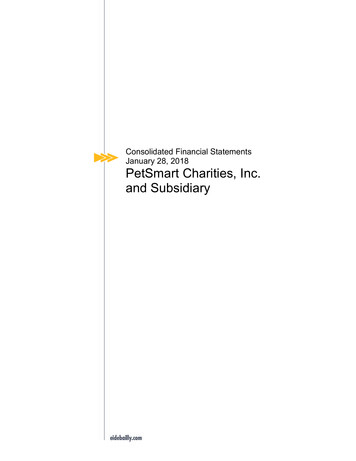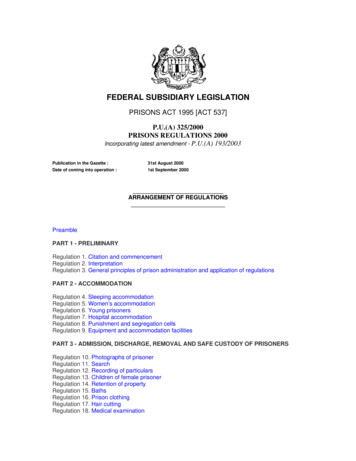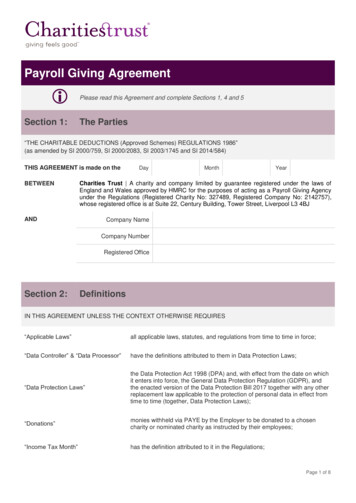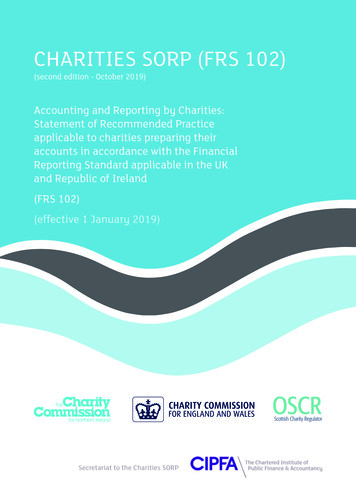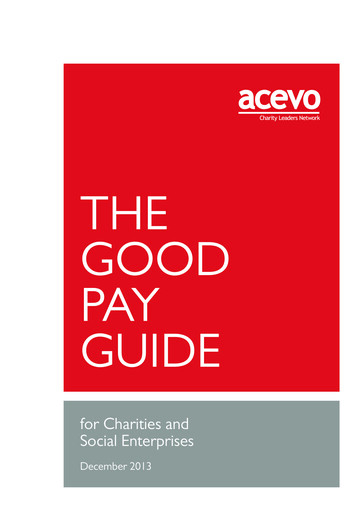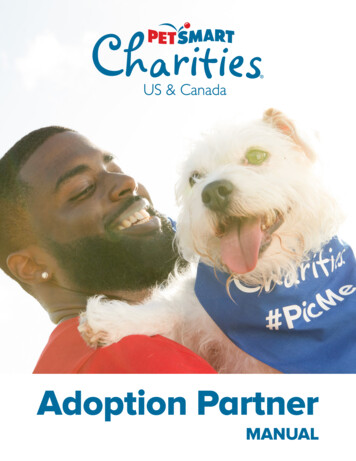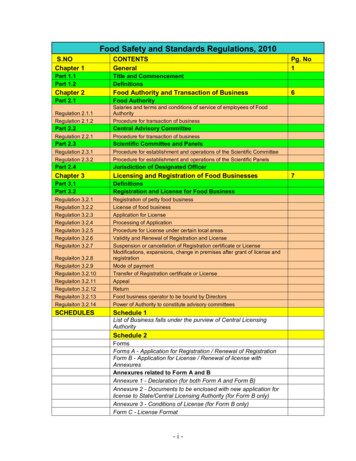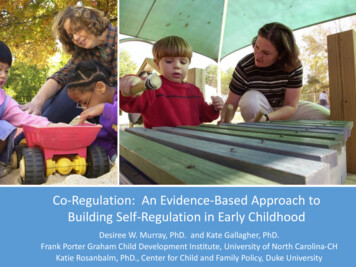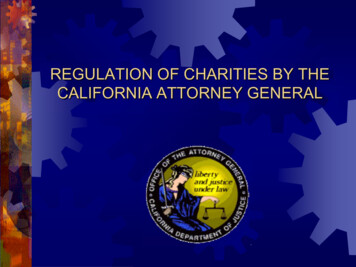
Transcription
REGULATION OF CHARITIES BY THECALIFORNIA ATTORNEY GENERAL
Outline of Presentation Overviewof AG’s OversightResponsibilities AG’sRegistry of Charitable Trusts Enforcement Program Dutiesof Charities and their Directors,Officers, and Trustees Charity Fundraising Donor Tips Raffles
Overview AGhas primary responsibility foroverseeing charities and charitablesolicitations Includescharitable corporations,unincorporated associations and charitabletrusts; also fundraising professionals AG responsible for protecting charitableassets because they benefit allCalifornians
Overview CharitableTrusts Section carries out theAG’s responsibilities Composed of Registryof Charitable Trusts Legal and Audits Unit
The Registry’s Role Manages registration and annual reportingrequirements Initial registration within 30 days of receivingassets (money, real property, or other assets) Initial registration requires a copy of governinginstrument, IRS Form 1023, and bylaws (seeRegistration Checklist atwww.oag.ca.gov/charities) Annual reporting (IRS Form 990 and RRF-1) Exempt from registration and reporting, but notoversight: religious corporations, educationalinstitutions, hospitals, health care service plans
The Registry’s RoleReceives and reviews notices of specifictransactions required to be submitted to AG: Sale/disposition of substantially all assets Voluntary dissolution Merger Conversion (to mutual benefit or for-profit ) Self-dealing transactions Loans to directors/officers Sale/transfer of nonprofit hospital facilities(Corp. Code, § 5000 et seq.)
Transactions RequiringAG Notice or Consent* Consent: Voluntary dissolution – requires AG waiver of noticeConversion to mutual benefit or for-profit corporationMerger involving a nonprofit public benefit corporation and afor-profit corporationLoans to directors and officers (with exceptions)Sale or transfer of nonprofit health facility20-Day Notice Only: Sale or disposition of substantially all assetsMerger involving two nonprofit public benefit, or religious,corporations*See Nonprofit Transactions Guide at www.oag.ca.gov/charities
Enforcement Program AGsafeguards, preserves, andrecovers charitable assets throughinvestigations, audits and legal actions Focus: mismanagement and diversionof charitable assets from intended use Cases developed from complaintsreceived and review of annual filings
Types of Enforcement Informalcontact; audit letter Subpoena Corrective action letter Assurance of voluntary compliance Administrative action Civil litigation Criminal charges
Attending to Governance Directors and Officers are responsible for managingand preserving charitable assetsCA Nonprofit Public Benefit Corporation Law governsBoard duties and responsibilitiesActivities and affairs of a corporation must beconducted, and all corporate powers exercised, by orunder the direction of the BoardThis ultimate decision-making role cannot bedelegated to anyone else*See parts VI and VII of Form 990, and Guide to Form 990 atwww.oag.ca.gov/charities
Attending to Governance:Board Duties and Responsibilities Statutory standard: a director must performhis/her duties In good faith In a manner the director believes to be inthe best interest of the organization With such care, including reasonableinquiry, as an ordinarily prudent personwould do in the same position under similarcircumstances
Attending to Governance:Critical Principles Be actively engaged and attentive: ask questions anddemand answers!Scrutinize budgets and keep an eye on potential risksAvoid conflicts of interest and self-dealingtransactionsScrutinize executive compensationMake sure Officers and key employees are doingtheir jobsClosely examine and monitor fundraising practicesand activities
Governance: Critical Principles(con’t.) CharityOfficers and Directors areaccountable for charitable assets Officers/Directors may be personallyfinancially liable for harm theiractions/inaction caused the charity
Caution: Use of Restricted AssetsAssets are restricted by charity’s governingdocuments, donor designation, or content ofsolicitation Duty to use in accordance with restriction Must be able to account for use inaccordance with restriction Avoiding problems: SegregateScrutinize charity’s solicitation language
Complying with Requirementsof Other Government AgenciesSOS FTB IRS Local jurisdictions may regulate solicitation[see list on AG website Resources page] Multi-state solicitation campaigns [informationavailable at www.multistatefiling.org ]
The Independent Audit Requirement Appliesto the following entities with 2million or more in gross revenue* NonprofitCorporations Unincorporated Associations Trusts[Unless exempt from registration and reporting]* Audit FAQ’s are available on AG’s website
Independent Audit Requirement:Definition of “Gross Revenue” Follow instructions for Line 12 of IRSForm 990 and Line 12, column (a) ofIRS Form 990PF.Non-cash and one-time contributions,and income from special events areincluded in the definition.Revenue from government grantsand contracts for services for whichan accounting is required areexcluded from the definition.
Independent Audit Requirement(con’t.) Independentaudited financialstatements must be made available tothe Attorney General and the public Includes all statements and notes butNOT the management letter Complete no later than 9 months afterclose of fiscal year
Audit Committee Requirement Ifrequired to conduct independentaudit, must have an audit committee Appointedby governing Board May be only one person Can be non-governing Board members Cannot include 50% or more of membersof Finance Committee Cannot include President/CEO,Treasurer/CFO, staff members, oremployees
Duties and Responsibilitiesof the Audit Committee Recommendhiring and firing of auditorto the Governing Board Confirm that financial affairs are in order Review and accept/reject audit Approve non-audit services by auditor
Executive Compensation ReviewReview and approval of executivecompensation is a critical responsibility “Compensation” includes salary, bonuses,and retirement and all other benefits Compensation review requirement applies toall Nonprofit corporationsUnincorporated associationsCharitable TrustsGov. Code, § 12586, subd. (g)
Executive Compensation Review (con’t) Mustbe reviewed and approved byBoard or authorized committee of Boardfor the following positions: Presidentor CEO Treasurer or CFO Or others with comparable powers andduties
Executive Compensation Review(con’t.) Reviewpoints: Initialand approval required at 3hiring of the Officer Upon renewal or extension of the Officer’semployment term Modifying the Officer’s compensation Compensation must be “just andreasonable” (consider comparables,officer’s qualifications, & other factors)
Executive Compensation Review (con’t.) Review is ALSO required for at-will Officers on initialhiring and whenever compensation modifiedNo review required for staff or Officers paid morethan President or CEO, and Treasurer or CFO, butthe charity must ALWAYS exercise due care toensure that the compensation is just and reasonableExcessive executive compensation is considered awaste of charitable assets and can result in liabilityfor Board members and Officers; it can alsojeopardize tax-exempt status
Top 9 Ways to Get Investigated Failing to ensure all regulatory filings are currentAllowing CEO/Executive Director sole controlFailing to hold regular Board meetingsFailing to regularly evaluate performance of CEO/ExecutiveDirectorFailing to properly record Board actions in meeting minutes [andpoor record-keeping in general]*Failing to implement adequate internal controlsAllowing self-dealing transactions without the analysis requiredby lawFailing to aggressively monitor the organization’s fundraisersFailing to ensure restricted gifts are used only per restriction* Note: the AG has a 10-year statute of limitations
Top Excuses That Will Only Make itWorse We’ve always done it that way.I didn’t know I had to register/No one told me.“So and So” was supposed to do that.We’re a volunteer Board and don’t have time to.I completely trusted Only our Treasurer gets to see the financial records.We threw those records away. No one told us we hadto keep them.
Charity Fundraising:Commercial Fundraisers Definition: Anyindividual/entity who does any of thefollowing for compensation:Solicits assets for charitable purposes Receives or controls such assets Employs any compensated person to do either AllCFRs must be registered with theAG’s RegistryGov. Code, § 12599
Charity Fundraising:CFR’s Notice of Intent to Solicit AllCFRs must file Notice of Intent toSolicit Filedwith Attorney General’s Registry 10 working days before the start of asolicitation campaign or event Exception for disaster solicitations –provide notice concurrent withcommencement of campaign
Charity Fundraising: WrittenContract Requirement Charityand CFR must enter into writtencontract for every solicitation campaignor event Contract is voidable unless thecommercial fundraiser is registered withthe Attorney General Must be signed by an official authorizedby the charity’s governing Board See model contract on AG’s website
Terms Required in FundraisingContracts with CFRs The written contract must state: Charitable PurposeObligations of both partiesFee arrangementEffective, start, and termination dates5-day limit to transfer contributions from CFR tocharityCharity control of content and frequencyMaximum amount to secure attendance at, orsponsorship of, an eventCancellation rightsGov. Code, § 12599, subd. (i)
Charity Fundraising:Fundraising Counsel Definition: A Fundraising Counsel is any individual or entitywho for compensation Plans, manages, consults or prepares materialfor solicitation of assets for charitable purposes Does not solicit assets for charitable purposes Does not receive/control such assets Does not employ persons who solicit assets orreceive/control such assetsGov. Code, § 12599.1
Requirements for CharityFundraising using FRCs Fundraisingcounsel must be registeredwith the AG’s Registry Notice of Intent to Solicit required ofFRCs is the same as with CFRs Written fundraising contract required Requiredterms are the same as for CFR’swith one addition: must state that FRC willnot solicit, receive, or control donatedfunds, assets, or property or employanother to do so
Charity Fundraising:Contract Cancellation Rights Appliesto all fundraising professionals Contract voidable if CFR or FRC notregistered with Attorney General Right to cancel for any reason w/in 10days of executionGov. Code, § 12599.3
Charity FundraisingRemember: Charities are required by law to exercisecontrol over fundraising activities Approve written contractsApprove content of solicitationAssure no coercionHonor “Do Not Call” requestsCharities and their fundraisers must all beregistered with the Attorney General CFRs must transfer donated funds to charityor to account controlled solely by charitywithin 5 days of receipt Gov. Code, § 12599.6
Charity Fundraising:Prohibited ActsViolations of the registration and reportingrequirements (for charities & fundraisers) Unfair or deceptive acts or fraudulent conduct Using any name or symbol that suggests acontribution is for a particular charitableorganization when that is not true Representing that a contribution will be usedfor a charitable purpose when that is not true
Charity FundraisingProhibited Acts (con’t.)Representing that a person endorses acharitable solicitation unless that person hasagreed to do so in writing Representing that contributions solicited willbe given to another charity unless that charityhas given prior written consent Misrepresenting the net proceeds to bereceived by the charity Other prohibited acts (Gov. Code, § 12599.6)
CONTRACTING WITHFUNDRAISING PROFESSIONALS DO’s: Checkcharity and CFR/FRC registrationstatus with the Registry Review annual CFR report on AG’swebsite for CFR’s previous NET proceedsto charity Ask for and check CFR’s/FRC’s references Review model fundraising contract on AG’swebsite before signing any contract
CONTRACTING WITHFUNDRAISING PROFESSIONALS DO’s (con’t.):Review the script/pitch and fundraising materialscarefully before approvingBefore campaign starts, contact local governmentagencies to determine whether additionalpermits/licenses are requiredBefore signing any contract get an unambiguousand clear written estimate for all costs involved inthe campaign and make sure that these estimatesmatch those quoted in the contractKeep copies of relevant documents (contract,invoices, bank records, etc.)
CONTRACTING WITHFUNDRAISING PROFESSIONALS DON’T Bemisled by “get-rich-quick” promises Forget that donors care about the cost offundraising - donors want a highpercentage of their contribution to be usedfor program services, not for fundraising Sign contracts for fundraising serviceswithout researching the company forcomplaints, etc.
Record-keeping Requirements forCFRs Keep records for 10 yearsDocument all revenue and expenses Cash: date and amountNon-cash: date, amount, name and address ofdonorName and address of each employee or agentinvolvedBank account numbers, names, locationsGov. Code, § 12599.7
DONOR TIPS DO’sbefore donating: Learnabout the charity & review itsfinancial disclosure reports (ask for writteninformation or research on the internet) Ask if the solicitor is being paid to solicit Ask what percentage of the donationsraised is paying for fundraising expenses Make sure donation is tax deductible
DONOR TIPS (con’t.) DO’s(con’t.): Watchout for “copy-cat” names Confirm law enforcement agency appeal Consider cost of “freebies” DON’Ts: Makecash donations, or give SSN orcredit card number to anyone Give a donation when you feel pressuredor uncomfortable
Raffle RegulationOverview Araffle is a type of lottery Lotteries are illegal unless statutoryexception Penal Code sec. 320.5 Createsa limited “charity-raffle” exceptionto California law prohibiting lotteries
What Is A Raffle? A“raffle” involves the purchase of achance to win a prize “Raffle” elements: Paymoney Paper ticket with identifying number anddetachable stub Drawing held to determine winner
RafflesLimits On Who Can Conduct Mustbe an “eligible” organization: Aprivate nonprofit organization; Qualified to do business in CA for at leastone year before raffle conducted; and Tax exempt under specific Rev. and Tax.Code sections*Does not include public schools or other governmententities
RafflesAnnual RegistrationMust be registered with Attorney Generalprior to conducting raffle:September 1 – August 31 Separate from charity registration underGovernment Code Must have confirmation letter from Registrybefore raffle conducted Each chapter of statewide organization mustregister separately *Exemption: nonprofit religious organizations,educational institutions, hospitals, BUT mustcomply with all other provisions of § 320.5
RafflesRestrictions 90%of gross receipts from ticket salesfor each draw must either: Beused by the organization conducting theraffle for its charitable or beneficial purpose Or given to another eligible organization touse for its charitable or beneficial purpose
RafflesRestrictions Proceedsmust be used in California Non-restricted funds from sources otherthan tickets can be used to pay for costs None of the 90% restricted funds can beused to compensate a person inconnection with operation of the raffle Can advertise, but not conduct raffleson the internet
RafflesRestrictionsCannot use gaming machines to conductraffles Cannot sell tickets or conduct raffle in asatellite wagering facility, at a racetrack orgambling establishment No legal entity or individual may hold financialinterest in the raffle except eligibleorganization conducting, or receivingproceeds from, the raffle
RafflesReportingNew: A single aggregate report for all rafflesheld during the year FAQs and reporting form on AG website Report(s) filed no later than 10/1 Reporting requires precise financial records Total funds received Total expenses Charitable or beneficial purpose for whichproceeds used Name of eligible organization receivingproceeds
RafflesExemption from RegulationA raffle is exempt if it meets all of theserequirements:It involves general and indiscriminatedistribution of tickets; Tickets are offered on same terms andconditions as tickets for which donation given;AND Participants are not required to pay for achance to win Penal Code, § 320.5, subd. (m)
Raffles: FAQ’s Dowe have to register if we call it an“opportunity drawing?” Ifparticipants are required to “pay toplay” in order to have a chance to win aprize, the drawing is subject to theprovisions of Penal Code section 320.5and related regulations.
Raffles: FAQ’s Isa silent auction the same as a raffle? No.A silent auction is not the same asa raffle. In a silent auction only theperson willing to pay the highest bidamount is able to obtain the item.
Raffles: FAQ’s How At Ifdo we register to hold a raffle?least 60 days before the raffle submit:Application for registration, 20 fee, and copyof FTB exemption letter/entity status letterless than 60 days before the raffle:Applications are processed in the order theyare received No expedited services are available (*see raffle checklist on AG’s website)
Raffles: FAQ’s Whathappens if we don’t register? An eligible organization must beregistered with the Attorney Generalprior to conducting any activityassociated with a raffle. Failure tocomply with the provisions of section320.5 is a misdemeanor; violations maybe forwarded to local law enforcement.
RESOURCES AG’sWebsite Charity& Fundraiser Filings Forms & Publications:Registration guide Guide to submitting transactions Guide for Charities Forms and instructions Laws and regulations Model contract Resources re: conduct of raffles Contactinformation for other governmentagencies, legal services, & technicalassistance
Attorney GeneralContacts and Information Website resources (including registration & reporting,raffles, etc.) www.oag.ca.gov/charitiesRegistration contact information: Registration Renewal contact information delinquency@doj.ca.gov; (916) 210-6400 ext. 6Raffle contact information: rrf1@doj.ca.gov; (916) 210-6400 ext. 5Delinquency contact information registration@doj.ca.gov; (916) 210-6400 ext. 4raffles@doj.ca.gov; (916) 210-6400 ext. 9Other specific questions: tania.ibanez@doj.ca.gov
carefully before approving Before campaign starts, contact local government agencies to determine whether additional permits/licenses are required Before signing any contract get an unambiguous and clear written estimate for all costs involved in the campaign and make sur


